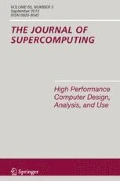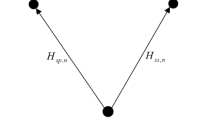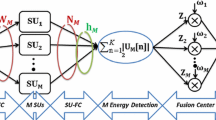Abstract
In cooperative cognitive radio networks (CCRNs), resource allocation can be viewed as a multi-objective optimization issue in terms of channel capacity as well as, among numerous others, the transmitted power, and the QoS limitations. Many researchers have been undertaken to overcome individual problems, not multi-objective problems. In this paper, we investigate multi-objective problems, such as energy consumption, queuing problems, priority levels of traffic classes, fairness, throughput, and user quality requirements. We propose a hybrid optimization algorithm for CCRNs (HCCRN), which enhances the resource allocation. The first contribution of this paper is to propose the load balance enhanced particle swarm optimization algorithm for energy-efficient cluster formation, which overcomes queuing problems. In the second contribution, we consider multiple factors as the input of a multi-factor differential evolution optimization algorithm for prioritizing the traffic levels. The third contribution is that the fair routing path is computed by a modified gravitational search algorithm that enhances resource allocation throughput. For testing purpose, the proposed HCCRN algorithm applied to IEEE 802.11 WLANs. Simulation results show that the users achieve required resources via the proposed HCCRN, thus providing energy efficiency, fairness, throughput, and QoS.




Similar content being viewed by others
Change history
07 October 2022
This article has been retracted. Please see the Retraction Notice for more detail: https://doi.org/10.1007/s11227-022-04861-1
References
Zhang H, Jiang C, Beaulieu N, Chu X, Wen X, Tao M (2014) Resource allocation in spectrum-sharing OFDMA femtocells with heterogeneous services. IEEE Trans Commun 62(7):2366–2377
Zhang H, Chu X, Guo W, Wang S (2015) Coexistence of Wi-Fi and heterogeneous small cell networks sharing unlicensed spectrum. IEEE Commun Mag 53(3):158–164
Dastangoo S, Fossa C, Gwon Y, Kung H (2016) Competing cognitive resilient networks. IEEE Trans Cogn Commun Netw 2(1):95–109
“1000x: More Spectrum-Especially for Small Cells,” in Presentation by QUALCOMM Inc., 2013
Enabling Spectrum Sharing and Small Cell Wireless Broadband Services in the 3.5 GHz Band, 2013
Chandrasekhar V, Andrews J, Muharemovic T, Shen Z, Gatherer A (2009) Power control in two-tier femtocell networks. IEEE Trans Wireless Commun 8(8):4316–4328
Kang X, Zhang R, Motani M (2012) Price-based resource allocation for spectrum-sharing femtocell networks: a stackelberg game approach. IEEE J Select Areas Commun 30(3):538–549
Yun J, Shin K (2011) Adaptive Interference Management of OFDMA Femtocells for Co-Channel Deployment. IEEE J Select Areas Commun 29(6):1225–1241
Guruacharya S, Niyato D, Kim D, Hossain E (2013) Hierarchical Competition for Downlink Power Allocation in OFDMA Femtocell Networks. IEEE Trans Wireless Commun 12(4):1543–1553
Huang J, Krishnamurthy V (2011) Cognitive base stations in LTE/3GPP Femtocells: a correlated equilibrium game-theoretic approach. IEEE Trans Commun 59(12):3485–3493
Ha V, Le L (2014) Distributed base station association and power control for heterogeneous cellular networks. IEEE Trans Veh Technol 63(1):282–296
Liu Yanqing, Dong Liang (2014) Spectrum sharing in MIMO cognitive radio networks based on cooperative game theory. IEEE Trans Wireless Commun 13(9):4807–4820
Chen J, Swindlehurst A (2012) Applying bargaining solutions to resource allocation in multiuser MIMO-OFDMA broadcast systems. IEEE J Sel Top Signal Process 6(2):127–139
Ni Q, Zarakovitis C (2012) Nash Bargaining game theoretic scheduling for joint channel and power allocation in cognitive radio systems. IEEE J Select Areas Commun 30(1):70–81
Prasad N, Li K, Wang X (2009) Fair-rate allocation in multiuser OFDM-SDMA networks. IEEE Trans Signal Process 57(7):2797–2808
Kramer G, Marić I, Yates R (2006) Cooperative communications. FNT Netw 1(3–4):271–425
Zhang S, Xu W, Li S, Lin J (2013) Resource allocation for the cluster-based cooperative multicast in OFDM-based cognitive radio systems. J China Univ Posts Telecommun 20(4):1–7
Uddin M, Assi C, Ghrayeb A (2014) Joint optimal AF relay assignment and power allocation in wireless cooperative networks. Comput Netw 58:58–69
Long Y, Li H, Yue H, Pan M, Fang Y (2014) SUM: spectrum utilization maximization in energy-constrained cooperative cognitive radio networks. IEEE J Sel Areas Commun 32(11):2105–2116
Hua S, Liu H, Zhuo X, Wu M, Panwar S (2014) Exploiting multiple antennas in cooperative cognitive radio networks. IEEE Trans Veh Technol 63(7):3318–3330
Ding L, Melodia T, Batalama S, Matyjas J (2015) Distributed resource allocation in cognitive and cooperative ad hoc networks through joint routing, relay selection and spectrum allocation. Comput Netw 83:315–331
Asheralieva A, Mahata K (2015) Resource allocation for LTE-based cognitive radio network with queue stability and interference constraints. Phys Commun 14:1–13
Rahman M, Lee Y, Koo I (2016) An efficient transmission mode selection based on reinforcement learning for cooperative cognitive radio networks. Human-centric Comput Inf Sci 6(1)
Tang M, Xin Y (2016) Energy efficient power allocation in cognitive radio network using co-evolution chaotic particle swarm optimization. Comput Netw 100:1–11
Janatian N, Modarres-Hashemi M, Sun S (2016) Joint versus separate spectrum sensing and resource allocation in OFDMA-based cognitive radio networks. IET Commun 10(7):839–847
Das D, Das S (2016) A novel approach for energy-efficient resource allocation in double threshold-based cognitive radio network. Int J Commun Syst
Pandian M, Sichitiu M, Dai H (2015) Optimal resource allocation in random access cooperative cognitive radio networks. IEEE Trans Mob Comput 14(6):1245–1258
RejinaParvin J, Vasanthanayaki C (2015) Particle Swarm optimization-based clustering by preventing residual nodes in wireless sensor networks. IEEE Sens J 15(8):4264–4274
Li H, Zhang L (2013) A discrete hybrid differential evolution algorithm for solving integer programming problems. Eng Optim 46(9):1238–1268
Naji H, Sohrabi M, Rashedi E (2012) A high-speed, performance-optimization algorithm based on a gravitational approach. Comput Sci Eng 14(5):56–62
Nocedal J, Wright S (1999) Numerical optimization, 1st edn. Springer, New York
Abdulhay E, Elamaran V, Arunkumar N, Venkatraman V (2018) Fault-tolerant medical imaging system with quintuple modular redundancy (QMR) Configurations. J Ambient Intell Human Comput. https://doi.org/10.1007/s12652-018-0748-9
Enas Abdulhay N, Arunkumar KN, Vellaiappan E, Venkatraman V (2018) Gait and tremor investigation using machine learning techniques for the diagnosis of Parkinson disease. Future Gener Comput Syst 83:366–373. https://doi.org/10.1016/j.future.2018.02.009
Vardhana M, Arunkumar N, Abdulhay E (2018) Iot based real time trafic control using cloud computing. Cluster Comput. https://doi.org/10.1007/s10586-018-2152-9
Enas A, Mazin AM, Dheyaa AI, Arunkumar N, Venkatraman V (2018) Computer aided solution for automatic segmenting and measurements of blood leucocytes using static microscope images. J Med Syst. https://doi.org/10.1007/s10916-018-0912-y
Arunkumar N, Ramkumar K, Venkatraman V (2018) Entropy features for focal EEG and non focal EEG. J Comput Sci. https://doi.org/10.1016/j.jocs.2018.02.002
Liu C, Arunkumar N (2018) Risk prediction and evaluation of transnational transmission of financial crisis based on complex network. Cluster Comput. https://doi.org/10.1007/s10586-018-1870-3
Meng G, Arunkumar N (2018) Construction of employee training program evaluation system of three exponential forecast based on sliding window. Cluster Comput. https://doi.org/10.1007/s10586-017-1652-3
Chen X, Pang L, Guo P, Sun X, Xue Z, Arunkumar N (2017) New upper degree of freedom in transmission system based on wireless G-MIMO communication channel. Cluster Comput. https://doi.org/10.1007/s10586-017-1513-0
Hamza R, Muhammad K, Arunkumar N, Ramírez González G (2017) Hash based encryption for keyframes of diagnostic hysteroscopy. IEEE Access. https://doi.org/10.1109/ACCESS.2017.2762405
Fernandes SL, Gurupur VP, Sunder NR, Arunkumar N, Kadry S (2017) A novel nonintrusive decision support approach for heart rate measurement. Pattern Recogn Lett. https://doi.org/10.1016/j.patrec.2017.07.002
Author information
Authors and Affiliations
Corresponding author
Additional information
This article has been retracted. Please see the retraction notice for more detail:https://doi.org/10.1007/s11227-022-04861-1
Rights and permissions
Springer Nature or its licensor holds exclusive rights to this article under a publishing agreement with the author(s) or other rightsholder(s); author self-archiving of the accepted manuscript version of this article is solely governed by the terms of such publishing agreement and applicable law.
About this article
Cite this article
Bharathi, G.P., Jeyanthi, K.M.A. RETRACTED ARTICLE: An optimization algorithm-based resource allocation for cooperative cognitive radio networks. J Supercomput 76, 1180–1200 (2020). https://doi.org/10.1007/s11227-018-2588-y
Published:
Issue Date:
DOI: https://doi.org/10.1007/s11227-018-2588-y




